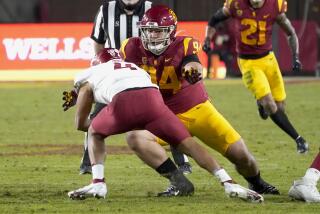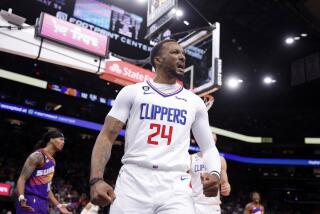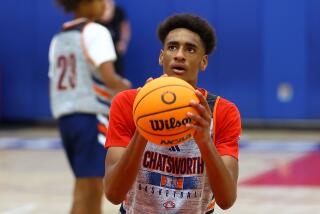He’s Back at Guard and Back on Track : Polee Is Glad to Call Pepperdine Home
- Share via
I was so lost,” said basketball star Dwayne Polee when asked why he transferred from Nevada-Las Vegas to Pepperdine at the end of his freshman year in 1982.
“I don’t know; I just felt so lost.”
Polee, named the 1981 Los Angeles City 4-A Player of the Year after he led Manual Arts High School to a City championship, said he chose Nevada-Las Vegas and Coach Jerry Tarkanian from about 100 colleges that offered him scholarships.
“Tarkanian came into our household and convinced me that his school was the place I needed to be,” Polee said. But he added that, after a year with the Running Rebels as the team’s second man off the bench, he decided he needed to be somewhere else.
Tarkanian could not be reached for comment on the reasons for Polee’s departure. But Polee, pressed further, said, “I didn’t realize what I wanted out of college basketball and college. Later it came down to that I wanted more than basketball; I wanted to be a part of a university.”
He said he didn’t feel a part of his first college because he thought his classes (most with about 30 students and one or two with as many as 60) were too big for him. He said he also didn’t feel a part of “the attitude at Vegas that if you lose a game you lose the world.”
“I chose to leave because I didn’t feel comfortable.”
In his third year at Pepperdine and his second season as a starter, Polee, 21, is getting more and more comfortable and feels he is a part of the school. And opposing teams, particularly their top scorers, wish he would get lost.
Switched this season from small forward to guard, his usual position, the 6-5, 190-pound junior said he feels at home on the court--and in the classroom.
On a team with five starters scoring in double figures, Polee leads with an average of 15.7 points and is second in assists (73) to junior point guard Jon Korfas, who has 75.
His performances last week in an 82-65 win over Northern Arizona and a 76-71 defeat of Fordham were probably his best at Pepperdine. Against NAU, he scored a career-high 23 points, hitting 7 of 11 shots from the field and 9 of 9 from the foul line.
He is also noted for defense: Last year he kept Cal State Fullerton’s Leon Wood and Gonzaga’s John Stockton, both now playing in the NBA, from doing much scoring. In the Fordham game, he held that team’s leading scorer, Tony McIntosh, who had been averaging 23.1 points, to 17, and McIntosh scored only four points (on two baskets) in the first half as Pepperdine raced to a 39-24 lead.
Pepperdine Coach Jim Harrick said that Polee’s game against NAU was his best at the school and that he “did a magnificent job on Tony McIntosh, who must have got about eight points in the last few minutes of the game.”
For those two games, Polee was named the West Coast Athletic Conference player of the week.
He is enjoying life at Pepperdine. Of his life on the court, he said, “All the guys on the team respect me, and I respect them; it’s nice when someone needs you.
“Coach Harrick gives me and Korfas a lot of responsibility as co-captains. Korfas and I have to get the other guys up to win, and we try to do that.”
He felt hampered somewhat last year when Harrick, who had two veteran guards as well as USC transfer Korfas, switched him to forward. The Wave coach has admitted he made a mistake, saying he should have known that “a guy that skinny is going to get tattooed up front.”
“The most important thing is coaching is having talented athletes; the second most important thing is putting them in the right spots. When Dwayne came here I envisioned him as a miniature Michael Jordan (star of the Chicago Bulls), and he wasn’t. Plus I had two (starting) guards, and there was a need for a forward.”
‘Crowded in There’
Playing one-on-one is Polee’s game, and he wasn’t able to play his game very well at forward, trying to muscle his way to the basket against taller and heavier players. “When I was playing in my first year,” he said, “I really didn’t know what my role was and whether I would be accepted. It was very crowded in there with 6-8 and 6-9 guys and hard to move. I was so relieved when I was told I could play guard this year.”
He was also relieved that Pepperdine is a small university. “What’s so great about this school is that it’s not that big. My classes (religion, marriage and the family and leisure science this trimester) average about 15 students.”
He said he is majoring in social science and would some day like to work as a high school counselor, probation officer or recreation leader, “maybe at a park where I could keep kids off the streets or from just hanging out.”
He said that when he transferred from Nevada he had classes to make up, that he is doing so and is maintaining a 2.8 grade-point average (out of a possible 4 points).
He’s Being Pushed
“I get so much help academic-wise, and it’s such a change for me from Vegas to Pepperdine because I didn’t know what it took to be a student. Here I get help even when I don’t want it, and they are constantly pushing me to greater goals.”
Not surprisingly, Polee’s greatest goal is to play in the NBA, and he would love to play in his hometown with the Lakers or Clippers.
“I don’t think about the pros too much; what happens, happens. It would definitely be a lot of money, but I try to stay away from those thoughts. I hope to make it as a pro, but I’d be prouder of myself if I got a degree. They can’t take that away from me.”
He said he thinks he has to “improve my game in all phases” to become a pro. “I have to work on my dribbling because I’ve been out of dribbling for a while. I have to improve in controlling the tempo of the team, in shooting my jump shot and on defense; I like playing defense.”
Harrick outlines these areas of improvement for Polee while he is with the Waves: “He has been more consistent than he has been inconsistent, but he has to work on staying out of traffic, on handling the ball and getting into our offense, on playing under control and not blaming anybody else (like referees) for things that go wrong and on forgetting the past and looking toward the future.
“Above all, he has to keep from getting down on himself. We don’t want him to do that. Sometimes he tries too hard because he wants to please. In high school, he was a man among boys. He would challenge guys who were 6-7 and 6-8 and score on them; he can’t do that now.”
Harrick said that, in order for Polee to play pro ball, he has to get “physically stronger and mentally tougher. He has to learn how to take criticism.”
Said Polee: “My coach pushes me to be the best player that I can be. He tells me that good things come to those who work hard, and I believe it.”
More to Read
Go beyond the scoreboard
Get the latest on L.A.'s teams in the daily Sports Report newsletter.
You may occasionally receive promotional content from the Los Angeles Times.










